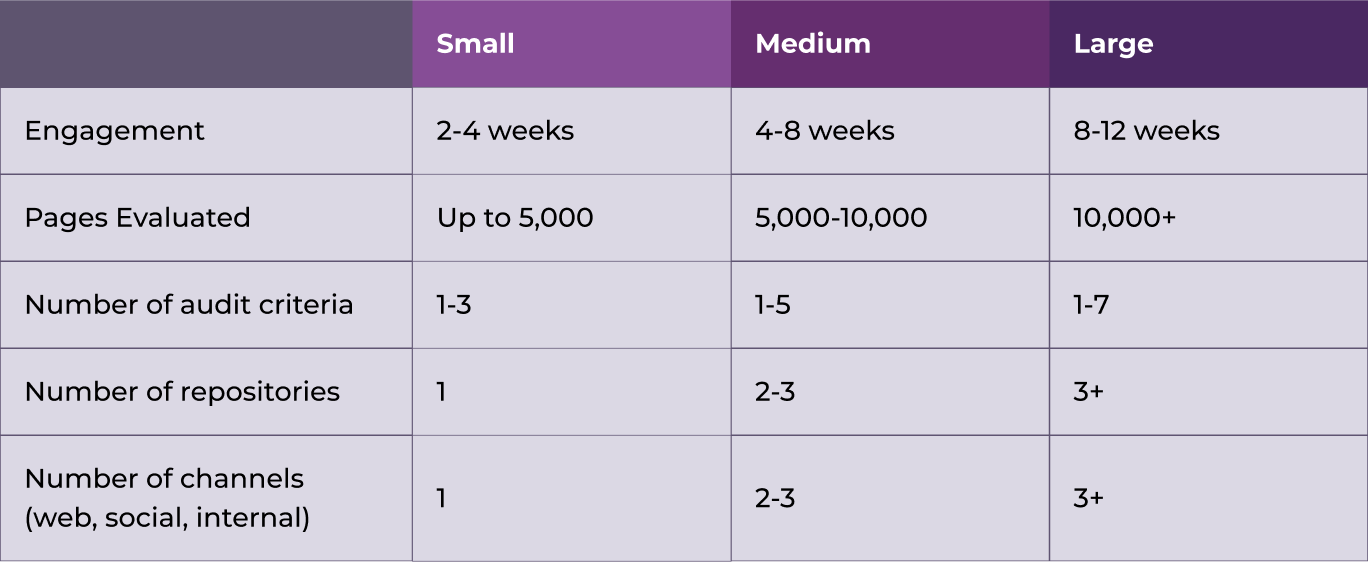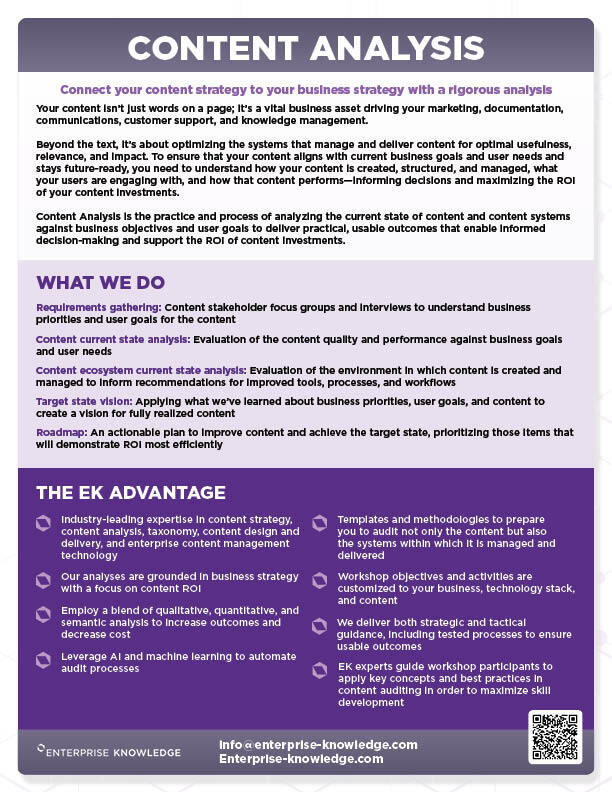Connect your content strategy to your business strategy with a rigorous analysis
Your content isn’t just words on a page; it’s a vital business asset driving your marketing, documentation, communications, customer support, and knowledge management.
Beyond the text, it’s about optimizing the systems that manage and deliver content for optimal usefulness, relevance, and impact. To ensure that your content aligns with current business goals and user needs and stays future-ready, you need to understand how your content is created, structured, and managed, what your users are engaging with, and how that content performs.
Content Analysis is the practice and process of analyzing the current state of content and content systems against business objectives and user goals to deliver practical, usable outcomes that enable informed decision-making and support the ROI of content investments.
What We Do
- Requirements gathering: Content stakeholder focus groups and interviews to understand business priorities and user goals for the content.
- Content current state analysis: Evaluation of the content quality and performance against business goals and user needs.
- Content ecosystem current state analysis: Evaluation of the environment in which content is created and managed to inform recommendations for improved tools, processes, and workflows.
- Target state vision: Applying what we’ve learned about business priorities, user goals, and content to create a vision for fully realized content.
- Roadmap: An actionable plan to improve content and achieve the target state, prioritizing those items that will demonstrate ROI most efficiently.
The EK Advantage
- Industry-leading expertise in content strategy, content analysis, taxonomy, content design and delivery, and enterprise content management technology
- Our analyses are grounded in business strategy with a focus on content ROI
- Employ a blend of qualitative, quantitative, and semantic analysis to increase outcomes and decrease cost
- Leverage AI and machine learning to automate audit processes
- Templates and methodologies to prepare you to audit not only the content but also the systems within which it is managed and delivered
- Workshop objectives and activities are customized to your business, technology stack, and content
- We deliver both strategic and tactical guidance, including tested processes to ensure usable outcomes
- EK experts guide workshop participants to apply key concepts and best practices in content auditing in order to maximize skill development
Why Content Analysis?
Content analysis is conducted in support of a variety of content initiatives. The outcomes you’re trying to achieve will drive the factors by which content and content systems are assessed. These initiatives may include:
- AI readiness: Assess the consistency of structure and completeness of content and metadata in order to assess AI readiness
- Knowledge management: Assess content duplication and discoverability across complex repositories and systems
- Search optimization: Evaluate structure, markup, and keywords to enhance search queries
- Dynamic content: Analyze the semantically meaningful components of content which would best enable publication of content in multiple end-user experiences
- Content transformation: Quantitative and qualitative analysis of content types, structure, and metadata to enable transformation from unstructured to structured content
Outcomes of a Content Analysis
At the end of a content analysis, you will have
- Shared understanding, vision, and alignment: Content stakeholders across the enterprise understand and champion the role of content in meeting business and user objectives
- Report of findings: Written report that documents the outcomes of the audit, including trends, opportunities, and gaps
- Actionable plan and roadmap: Detailed plan for content and content process improvement and optimization
- Content Governance Plan: Processes to improve accountability and lifecycle management of content to ensure that it is updated and maintained, guaranteeing usability and accuracy
- Preparedness for advanced content capabilities: Skills and repeatable processes to support current and future initiatives, including AI and composable content
How Does It Work?


